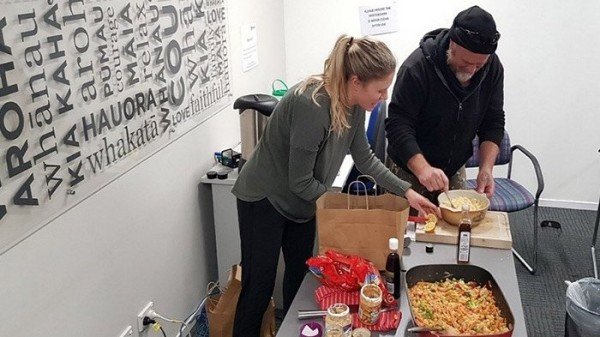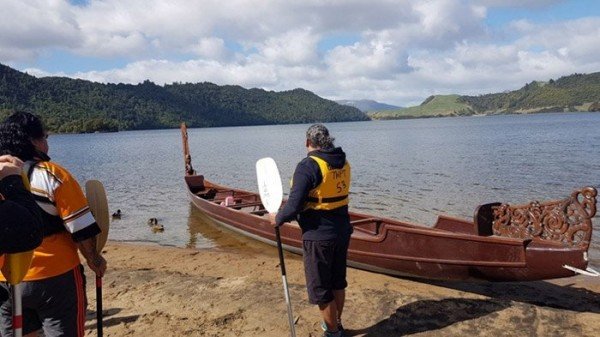Tane Takitu Ake ki Taupō
Source: Te Ara – The Encyclopedia of New Zealand, https://teara.govt.nz/en/diagram/31387/maori-health-te-whare-tapa-wha-model.
Tama tū, tama ora. Tama noho, tama mate.
He who stands lives. He who sits perishes.
Tane Takitu Ake ki Taupō (Men standing strong in Taupō) is a kaupapa Māori six-week program with a focus on Māori men's health with, or at risk of developing, multi-morbidities.
This behavioural change and lifestyle medicine program has been established alongside a similar programme that has been running successfully in Rotorua. The facilitators gifted the program to Pinnacle peer support worker Shane Rakei to adapt for the Taupō/Tuwharetoa region.
The Te Whare Tapa Whā model of dimensions of wellbeing are the four pillars of the programme:
- taha hinengaro – psychological health
- taha whānau – family health
- tahu wairua – spiritual health
- taha tinana – physical health.
Three sessions were held each week involving health and wellbeing education, water and land-based exercise and one-on-one consultations.
Guest speakers from the Cancer Society, Heart Foundation, Tipu Ora smoking cessation and the Alcohol and Drug rehabilitation team provided education sessions. Further support was offered by Leanne Te Karu; Pihanga Health’s prescribing pharmacist, Rachel Dykes; Lakes DHB COPD nurse specialist, and the Lakes extended care team.
Whaowhia te kete mātauranga – fill the basket of knowledge
The men were well engaged and asked many questions in the education sessions. The group’s bond, cohesiveness and re-connection with their culture encouraged ongoing motivation for the programme.
On the day of the dietary focussed education session, morning tea was provided and for some it was their first experience of eating hummus.
“They were keen to learn how to make hummus themselves as well as explore healthy ways to cook fish and vegetables.” says Shane Rakei, Pinnacle peer support worker who led the programme. “They boiled the fish instead of using butter and used onions to enhance the flavour.”
The men enjoyed the hands-on participation of the session, one noting it was a “brilliant kōrero and cooking demo.”

Pictured above: Nutrition session and cooking demonstration with Katie Harris, Pinnacle dietitian.
A key theme to strongly emerge from the programme was the increased level of new confidence in the group to discuss with their doctors the medications they are prescribed, and what the medications are for.
Participant feedback showed the education sessions were easy to understand, relatable, helpful and they could see the connection to the ways the knowledge would benefit their own whānau. In particular, the men felt the gout and medications session led by Leanne Te Karu, Pihanga Health clinical pharmacist, was so valuable that a follow-up session was organised.
A particularly memorable team building experience for all included the paddling of a waka tētē (a fishing / peoples canoe with a carved figurehead and vertical stern piece) across Lake Okareka and back.
It was an “awesome experience” said a participant. “Now I know the difference between waka (canoe). Good for the wairua (spirit), hinengaro (mind) and exercise.”

Pictured above: Preparing to paddle the waka tētē.
“It has been enormously encouraging to see positive changes in the participants,” says Shane.
“Before the programme, one of the men virtually never left his house. He has since been regularly attending the pool sessions. His whole disposition/taha hinengaro has changed. Although naturally shy, he is noticeably happier and has continued to engage and participate in the programme. He was also the recipient of the Toa Tane award, awarded to the person who has made the most significant changes of the group.”
He waka eke noa – we’re all in this together
Tikanga (Māori custom), learning a mihi (greeting/tribute) and a haka (cultural performance) are topics participants have asked to be included in future programs. Other suggestions have included bush walks and learning the properties of native plants.
They group has also requested to stay involved in the program, so they can mentor future participants.
“Going forward the participants will evaluate, co-design and provide leadership to future programmes with Shane as well as continue to lead their own cohort,” says Pen, Pinnacle Taupō clinical manager.
News of the programme has been circulating in the local community. Marae clinic nurses have been making enquiries and spreading the word for referrals.
Future program development considerations include the improved use of data and evaluation techniques, continuing to grow groups alongside marae and general practice supported clinics and growing groups with health improvement practitioners input into behavioural change action plans and support.
“We are also supporting the development of a complimentary women’s group with Tuwharetoa Whānau Ora Tiwhana”, says Pen.